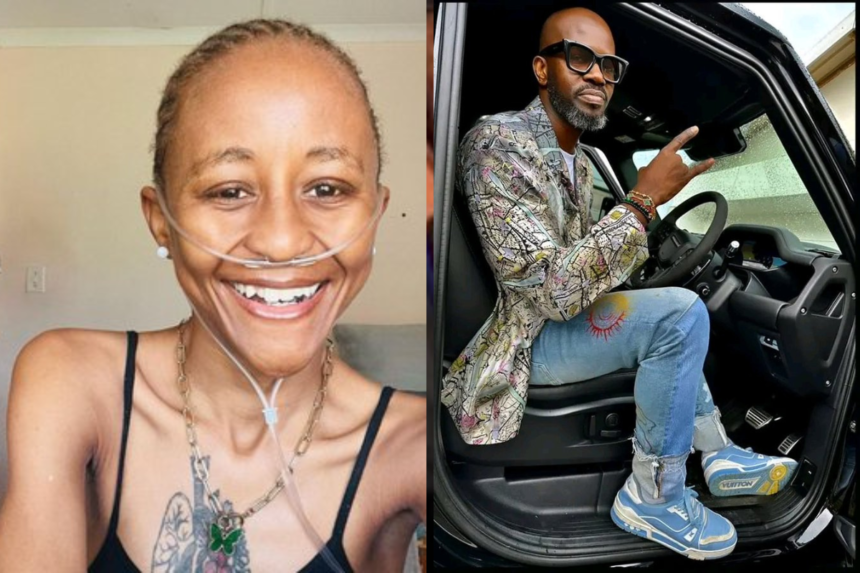Black Coffee, the internationally acclaimed DJ and producer, recently found himself embroiled in a whirlwind of controversy, sparked by a Twitter user’s accusation. This incident unfolded when a netizen took to the social media platform to call him out, alleging that he had not extended a helping hand to Nompilo Dlamini, despite his considerable wealth. The online discourse that followed highlights the power of social media in shaping public perceptions and generating debates about celebrities and their social responsibilities.
In the wake of Nompilo Dlamini’s passing, who was known as a Cystic Fibrosis Warrior, Black Coffee faced severe scrutiny on Twitter. A user with the handle @joy_zelda publicly chastised the “Fetch Your Life” hitmaker. Stating, “We need to be honest about Black Coffee. He has done nothing for Black People besides music, and He is a Billionaire. Still, he couldn’t even help Nompilo Dlamini whenever she asks for donations, yet he wears R34k sneakers from Louis Vuitton, He is a disgrace.”
This tweet quickly ignited a firestorm of reactions from Twitter users. While some empathized with the tweep’s perspective, many fervently defended Black Coffee’s right to manage his wealth as he saw fit. The ensuing discussion brought to the forefront a range of viewpoints on celebrity philanthropy. Financial responsibility, and the boundaries of individual generosity.
@peekay_mab, one of Black Coffee’s supporters, expressed their support, stating, “Now you want to tell him how to spend his money?? You are crazy.” This response emphasized the idea that, as an individual, Black Coffee should have the autonomy to make choices regarding his finances. Without being dictated by public opinion.
@JesseFJacobs reinforced this notion, noting, “Black Coffee does a lot, but even if he didn’t help. It’s his money that he works very hard for. He can choose whether to help or not. People can’t be entitled to his money just because they support his music career.” This perspective highlights the idea that wealth does not necessarily equate to an obligation to provide financial assistance.
@SA_MLAMBO added to the discourse by stating, “Niyanya people work hard for their bag. Now you want to control him how to spend his money? Just because you don’t have it doesn’t mean you’re a good person or you were going to help her. Some of you NF, we see you on ‘I blew it.'” This comment underscores the idea that financial success should not be accompanied by societal expectations of charitable actions.
In contrast, @MrsPee3’s question, “Disgrace, with whose money?” prompts reflection on the origins of Black Coffee’s wealth. It raises the question of whether he has an ethical obligation to allocate his resources in support of charitable causes.
@Lovelinessmona and @GYerathel questioned the motivation behind the accusation. Asking, “Why are you dragging Black Coffee?” and sharing insights into Black Coffee’s past contributions. @GYerathel highlighted. “Black Coffee bought a machine Nompilo used when @biphakathi took her to Cape Town.” These comments point out the complexities of charitable acts, including the need for discretion and the possibility of anonymous contributions.
@NkalaBekithemba offered a perspective on the importance of personal choice when it comes to philanthropy. Stating, “Interesting why people expect others to do something because they are rich. They have worked hard for that and owe no one anything. Secondly, when people give, they don’t have to announce it.” This remark underscores the need for individuals to exercise agency in their giving, free from external pressures.
In summary, the heated Twitter discussion surrounding Black Coffee and his alleged lack of financial support for Nompilo Dlamini. Serves as a compelling example of how social media can amplify societal expectations, ethical considerations, and debates about the roles and responsibilities of celebrities in philanthropy. It underscores the complexity of issues surrounding financial assistance, personal autonomy, and the nuanced nature of charitable contributions. Ultimately, it is a reminder that public figures are subject to public scrutiny. Their actions or inactions can spark spirited conversations on social media platforms, shaping public opinions in the process.







